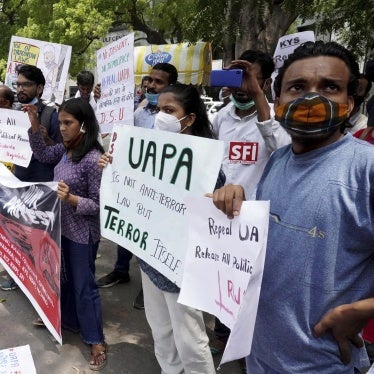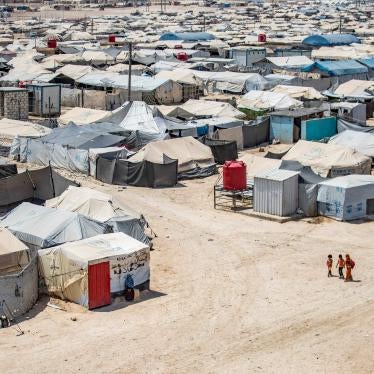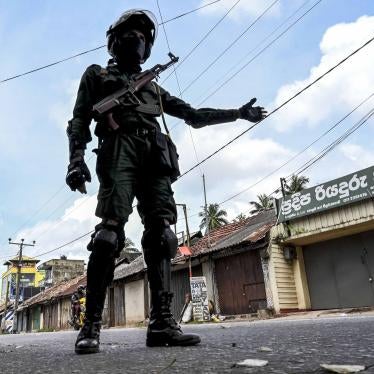(New York) - A new counterterrorism law in the Philippines contains overbroad and dangerous provisions which could allow authorities to hold detainees indefinitely and engage in spurious prosecutions, Human Rights Watch said today.
The Human Security Act of 2007, passed by the Philippine Congress in February and signed by President Gloria Arroyo in March, took effect on July 15. Numerous civil society leaders, religious figures, and human rights advocates have criticized the law, and the UN special rapporteur on human rights and counterterrorism has called for the law to be repealed or for its implementation to be delayed.
“The vague language of the Human Security Act invites the government to misuse it,” said Joanne Mariner, terrorism and counterterrorism director at Human Rights Watch. “The Philippine Congress should repeal or revise the act to comply with human rights standards.”
Human Rights Watch said that the new law contains an overly broad definition of terrorism, and overly harsh mandatory penalties applicable even to minor violations of the law. The law provides for the indefinite detention of terrorism suspects without adequate procedural protections, and permits persons apprehended in the Philippines to be rendered to countries that routinely commit torture, as long as the receiving government provides assurances of fair treatment.
Human Rights Watch said the Philippines was not adequately utilizing its existing legal system to prosecute perpetrators of bombings and other human rights abuses.
Human Rights Watch expressed concern about several of the new law’s provisions:
Article 3 defines terrorism as the commission of certain crimes, including murder, piracy, kidnapping, arson, and the destruction of property, that “sow[] and creat[e] a condition of widespread and extraordinary fear and panic among the populace, in order to coerce the government to give in to an unlawful demand.” The act sets the mandatory sentence for the crime of terrorism at 40 years without parole.
Human Rights Watch is concerned that this definition is vague and overbroad, and could allow the government to transform less serious offenses, such as vandalism, or legitimate acts of protest, into crimes punishable by a mandatory 40-year sentence. Under this definition, for example, a political protestor demanding that the president resign, who sets fire to an effigy (committing arson or destruction of property), could conceivably be charged with terrorism and, if convicted, sent to prison for 40 years.
Article 4, defining conspiracy, is likewise overbroad, setting a punishment of 40 years in cases where “two or more persons come to an agreement concerning the commission of the crime of terrorism . . . and decide to commit the same.” Because prosecutions under article 4 are possible even where no overt act has occurred, the provision compounds the problems with overbroad language in article 3. This could have a chilling effect on peaceful critics of the government seeking to hold political protests.
Human Rights Watch is also concerned about article 17 of the act, which allows regional trial courts to declare a group of persons to be a “terrorist and outlawed organization, association, or group,” and seize its assets and search its financial records, among other actions. Such a declaration can be made in cases where it is shown a group has engaged in terrorism (as defined in the overbroad language in article 3) but also in cases in which the government shows the group is “organized for the purpose of engaging in terrorism,” another term which is subject to the vague definition of terrorism in article 3. While the organization is supposed to be given due notice and opportunity to be heard, it and its members face a serious loss of rights without the benefit of a full judicial process.
Human Rights Watch also raised concerns about articles 18 and 19 of the new law, which regulate the detention of terrorism suspects. Article 18 doubles the period that the police can detain persons without judicial supervision, allowing up to three days of custody before the detainees must be brought before a judge. In a country where mistreatment in detention remains a major concern, this provision opens the door to further abuse.
Article 19, which covers cases of “actual or imminent terrorist attack,” (a term that is not defined and could potentially encompass less serious crimes, as discussed above), allows detention beyond three days if the police obtain the written approval of a court or a “municipal, city, provincial or regional official.” Because the provision sets no express limit to the allowable period of detention in such cases, it could conceivably be used to justify indefinite detention. Notably, the Philippines authorities have a history of holding suspects for extended periods without arraignment or trial, raising concern that the new law might essentially legitimize these abusive practices.
In addition, although the legislation purports to ban the practice of rendition – the unlawful transfer of a person to another country – it actually sets out broad exceptions to this ban. Those exceptions, which allow a detainee to be handed over to another government without a formal extradition proceeding if the detainee’s testimony is needed for a terrorism-related trial or police investigation, sanction the handover of terrorism suspects based on official assurances of fair treatment in the receiving state. As Human Rights Watch has documented in a series of reports, such diplomatic promises are an ineffective safeguard against torture and other human rights abuses.
A positive aspect of the new law is its ban on the use of torture, threats, and coercion against detainees. The law expressly provides that any evidence obtained by such means is inadmissible in any judicial or administrative proceeding.
Human Rights Watch recognizes that the Philippines has experienced numerous bombings and other attacks against civilians in recent years, and that the government has a strong and legitimate interest in prosecuting persons suspected of plotting mass violence. But Human Rights Watch cautioned that using overbroad and potentially abusive legislation would not advance the counterterrorism agenda.
“What the Philippines really needs is not a new and dangerously broad counterterrorism law, but better efforts to make its current justice system work,” Mariner said.








